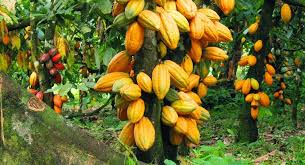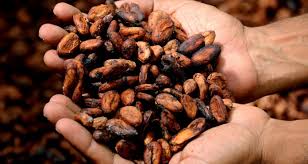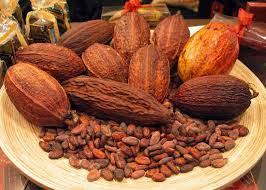HOW TO START YOUR PROFITABLE COCOA
FARMING BUSINESS
Cocoa (Theobroma cacao) is a small perennial tree crop that
primarily comes from three tropical regions; West Africa,
Southeast Asia, and Latin America. It usually ranges in height
between four and eight meters. Cocoa is an important cash crop
in Nigeria. It is the highest non-oil export in the country. The
cocoa market is estimated to hit 54 billion USD in 2026.
 There
are over 100 agricultural items you can export from Nigeria but
if you are looking for an industry where the network of the
business is over $900m and 309th most traded product in the
world, then let me introduce you to cocoa export business in
Nigeria There
are over 100 agricultural items you can export from Nigeria but
if you are looking for an industry where the network of the
business is over $900m and 309th most traded product in the
world, then let me introduce you to cocoa export business in
Nigeria
 Before
the oil boom in Nigeria, there was cocoa, which we banked on as
one of our major cash crops exports. Nigeria was then the
biggest exporter of cocoa in Africa and ranked amongst the top
exporters in the world. According to the Cocoa Association of
Nigeria (CAN), Nigeria ranks behind Cote D’Ivoire (1st), Ghana
(2nd) and Indonesia (3rd). Together, Ghana, Nigeria, and Cote
D’Ivoire supply more than two -thirds of the world’s cocoa. Before
the oil boom in Nigeria, there was cocoa, which we banked on as
one of our major cash crops exports. Nigeria was then the
biggest exporter of cocoa in Africa and ranked amongst the top
exporters in the world. According to the Cocoa Association of
Nigeria (CAN), Nigeria ranks behind Cote D’Ivoire (1st), Ghana
(2nd) and Indonesia (3rd). Together, Ghana, Nigeria, and Cote
D’Ivoire supply more than two -thirds of the world’s cocoa.
Another reason for cocoa farming in Nigeria is because it is a
perennial crop that can survive for many decades. Once planted
and nurtured to maturity, farmers can harvest from a cocoa tree
for many years. While initial cultivation can be a hassle, once
mature, cocoa trees could be a source of income for the farmer
for 40 years or more.
Cocoa production business requires a huge amount of money to
start. This capital will cover land acquisition, seed purchase,
pest control, equipment, harvesting, store set-up, e.t.c. Most
importantly, as soon as you begin, ensure to set aside some
funds for labour, pesticide and other expenses until harvest.
 There
are certain factors to consider when starting a cocoa farm which
includes; A large expanse of good land with the appropriate
climate conditions and with a good steady rainfall supply. The
farmer must invest in good quality, disease-resistant, and
high-yielding cocoa beans for planting. There
are certain factors to consider when starting a cocoa farm which
includes; A large expanse of good land with the appropriate
climate conditions and with a good steady rainfall supply. The
farmer must invest in good quality, disease-resistant, and
high-yielding cocoa beans for planting.
 Best
Climate conditions for Cocoa Farming in Nigeria; Cocoa farming
can only be done under very specific climatic conditions which
include 21–32oC temperature and 100–250 cm of rainfall, well
distributed throughout the year. Cocoa trees do not like too
much sun, and its natural habitat is under the heavy rain forest
canopy. That’s the reason why you rarely find a cocoa farm in
the northern part of Nigeria. Cocoa would only thrive in states
like Ondo, Ogun, Rivers, Cross River, Osun, Oyo, Ekiti, Imo, the
western, Eastern and Southern states of Nigeria where there is
abundant rain and less sun, according to Africa Business
Classroom. Best
Climate conditions for Cocoa Farming in Nigeria; Cocoa farming
can only be done under very specific climatic conditions which
include 21–32oC temperature and 100–250 cm of rainfall, well
distributed throughout the year. Cocoa trees do not like too
much sun, and its natural habitat is under the heavy rain forest
canopy. That’s the reason why you rarely find a cocoa farm in
the northern part of Nigeria. Cocoa would only thrive in states
like Ondo, Ogun, Rivers, Cross River, Osun, Oyo, Ekiti, Imo, the
western, Eastern and Southern states of Nigeria where there is
abundant rain and less sun, according to Africa Business
Classroom.
 Capital
also plays a large role in the kick-off of this business. A
potential merchant has to decide if he would be going into Cocoa
cultivation large scale or small scale. This decision would
influence the amount of capital he would be investing in the
business. This is why a good Business plan goes a long way in
determining the success rate of the cocoa cultivation business Capital
also plays a large role in the kick-off of this business. A
potential merchant has to decide if he would be going into Cocoa
cultivation large scale or small scale. This decision would
influence the amount of capital he would be investing in the
business. This is why a good Business plan goes a long way in
determining the success rate of the cocoa cultivation business
 Marketing
and Export: The international price of cocoa beans is currently
rising in response to high demand for cocoa products as the
industry wakes up to a potential long-term shortfall in global
supply. Climatic conditions, drought and aging cocoa farm in
most part of West Africa, the general tonnage of cocoa has
dropped drastically. A ton of cocoa seeds is sold between
$10,000 usd – $12,000 usd per ton in the International market.
Farmers and exporters are currently making between 50% to 100%
Return on Investment Marketing
and Export: The international price of cocoa beans is currently
rising in response to high demand for cocoa products as the
industry wakes up to a potential long-term shortfall in global
supply. Climatic conditions, drought and aging cocoa farm in
most part of West Africa, the general tonnage of cocoa has
dropped drastically. A ton of cocoa seeds is sold between
$10,000 usd – $12,000 usd per ton in the International market.
Farmers and exporters are currently making between 50% to 100%
Return on Investment
 Farmers
to Co-operatives – Farmer co-ops combine cocoa from several
farms to sell to different agencies. The co-op purchases cocoa
directly from farmers, and in some cases, sells it to exporters
directly. In other cases, the co-op may also export the product
directly. Farmers
to Co-operatives – Farmer co-ops combine cocoa from several
farms to sell to different agencies. The co-op purchases cocoa
directly from farmers, and in some cases, sells it to exporters
directly. In other cases, the co-op may also export the product
directly.
 Nearly
half of all Cocoa in Nigeria is exported to the Netherlands
(45%). Germany and Malaysia are ranked second and third in cocoa
imports from Nigeria, importing 22% and 6.2% of Nigeria’s cocoa
output, respectively. Other top importers of Nigerian cocoa
include Spain, Italy, Belgium-Luxembourg, and China. Nearly
half of all Cocoa in Nigeria is exported to the Netherlands
(45%). Germany and Malaysia are ranked second and third in cocoa
imports from Nigeria, importing 22% and 6.2% of Nigeria’s cocoa
output, respectively. Other top importers of Nigerian cocoa
include Spain, Italy, Belgium-Luxembourg, and China.
 Harvesting
and Processing Harvesting
and Processing
Patience for maturity: Cocoa trees take about 3-5 years to reach
maturity and produce harvestable pods. Be patient and maintain
good agronomic practices during this period.
How Much Does it Cost to Start a One Hectare Cocoa Farm in
Nigeria
The cost to start a one hectare cocoa farm is detailed below:
Acquisition of one hectare farmland: N100,000 – N400,000
Surveying and Land Documentation: N100,000 – N200,000
Clearing, Ploughing and Harrowing: N55,000
Seedlings: N120,000
Planting: N10,000
Irrigation: N300,000 – N650,000 (Optional)
Fertilizers and Manure: N20,000 – N100,000 (Depending on soil
fertility)
Pesticides: N20,000
Others: N100,000
 Harvesting:
Harvest ripe cocoa pods by hand, using a machete or knife. Take
care not to damage the tree or other pods during the process. Harvesting:
Harvest ripe cocoa pods by hand, using a machete or knife. Take
care not to damage the tree or other pods during the process.
 Remember,
cocoa farming requires continuous learning and adapting to
changing conditions. Seek guidance from agricultural extension
services, attend training programmes, and network with other
cocoa farmers to enhance your knowledge and maximise your
chances of success. Remember,
cocoa farming requires continuous learning and adapting to
changing conditions. Seek guidance from agricultural extension
services, attend training programmes, and network with other
cocoa farmers to enhance your knowledge and maximise your
chances of success.
Start a lucrative
cocoa farming Business. In this information, you will
learn the best way to market and profit from the cocoa
farming business. Most especially, you will learn the
exact costs of the resources and equipment you need for
your cocoa farming business. The body of this work is
formed from consulting experienced and relevant people
running the Cocoa farming business, to get first-hand
information about the success secrets and marketing
strategies deployed to achieve business success
Click here to fill our application form:
https://forms.gle/jt7DaqkmobimT5PX8
One on one practical training with ongoing support
from our resource person. Well-crafted training
initiatives aim to close skill gaps, thus boosting
individual performance. The success of this program
reflects our shared commitment to creating a better
future for our participants The trainees are evaluated
at the end of the training period to ascertain the
reliability of such training so as to assist in the
provision of necessary instrument needed for starting
the business or trade. Training is built on an active,
experimental and practical learning sessions. Our expert
advice is unique, actionable, and impossible to
replicate. No one else can provide the tailored insights
we offer, designed specifically for your success
.Imagine having a roadmap tailored just for you, guiding
you step by step toward your
career goals. Attendees will receive certificate
of participation at the end of the Training
Click here to fill our application form:
https://forms.gle/jt7DaqkmobimT5PX8 |
|
Our motivation is to see every Nigerian benefit from our
Unique Income opportunity, specially focused towards a
sustainable, entrepreneurial, and innovative future by
connecting them to new ideas and skills
Browse through our highly resource information
over 500 Business ideas.

|
|
This guide is designed to help business people including Micro,
Small and Medium Scale Entrepreneurs navigate the legal and
regulatory considerations relevant to starting-up and doing
business in Nigeria.CLICK HERE |
Creating
multiple streams of income can be a strong way to improve
your personal finances. Whether you’re trying to boost your
savings or build toward a goal, this is a move that many of
the most financially successful Nigerians make.CLICKHERE |
|
© All rights reserved 2024. 21st Strategies Consulting Nigeria
|
![]()







